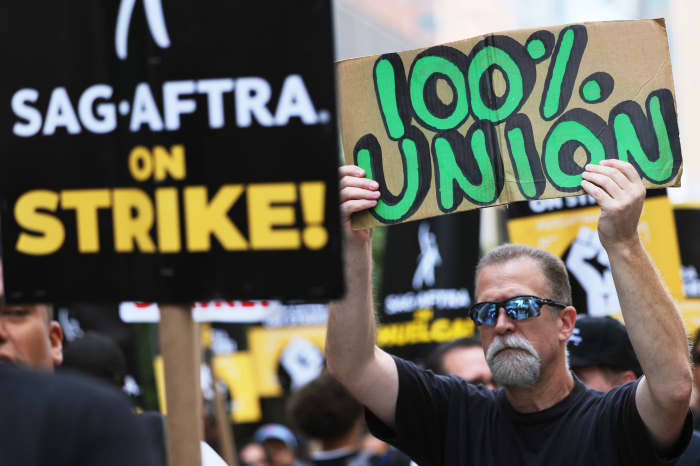California has lost about $5 billion of economic value after the Alliance of Motion Picture and Television Producers and the unions for writers and actors have failed to come to work agreements with studios and streaming services, resulting in independent strikes, according to new estimates Kevin Klowden, chief global strategist at the Milken Institute, a nonprofit think tank.
Those strikes between the AMPTP and the WGA and SAG-AFTRA have essentially paused new production in the entertainment industry, which has a major presence in California, specifically the Los Angeles area. The writers union has been striking since May and the actors union has been striking since July.
Klowden told the Financial Times that California’s economic loss comes from actors and writers not actively engaged in work, but it’s also impacting people who are peripherally related to the industry, including caterers, dry cleaners, car rental companies, truckers and other small businesses that rely on TV and film production..
“All these different people who provide support services that make productions happen – they’re getting nailed,” Klowden said.
It’s worth noting that while the entertainment industry has a predominant base of operations in California, other states in the U.S. like New York and Georgia have strong TV and film production infrastructure too.
Back in May, Todd Holmes, a professor of entertainment industry management at California State Northridge, estimated that the first 100 days of the strike had already cost the state at least $3 billion.
“It could be even worse than the $3 billion,” Holmes told the LA Times at the time.
Read on: Disney faces mounting challenges, but its Hulu ‘overhang’ could resolve sooner than expected
Warner Bros. Discovery
WBD,
“While WBD is hopeful that these strikes will be resolved soon, it cannot predict when the strikes will ultimately end,” the company said. “With both guilds still on strike today, the company now assumes the financial impact to WBD of these strikes will persist through the end of 2023.”
The WGA and SAG-AFTRA are striking over issues surrounding AI, residual payments and length of employment agreements, among many other concerns. The AMPTP is made up of major movie studios and streaming companies, including Netflix
NFLX,
Throughout the strike, many members of those unions have taken to social media to share their thoughts on several issues, particularly paltry residual payments they receive from their work. Among those people is Kamil McFadden, an actor known for his roles in Grown Ups 2 and K.C. Undercover, who posted a video of his residual payments which routinely are for less than a dollar.
Spencer Rothbell, who worked as a writer on shows like Clarence and Victor & Valentino, also posted a screenshot of a residual payment he received. It was for $8.57.
Roughly 87% of SAG-AFTRA members make less than $26,000 a year from their acting jobs, according to members, making them ineligible for health coverage through the union. The two unions are independently striking for the first time since 1960.
The lack of agreements between the unions and AMPTP has pushed back release dates of high-profile films including “Deadpool 3,” “Dune: Part Two,” and “Mission: Impossible—Dead Reckoning, Part Two.”
Read on: Netflix criticized for posting AI jobs paying up to $900,000 while writers and actors are on strike







